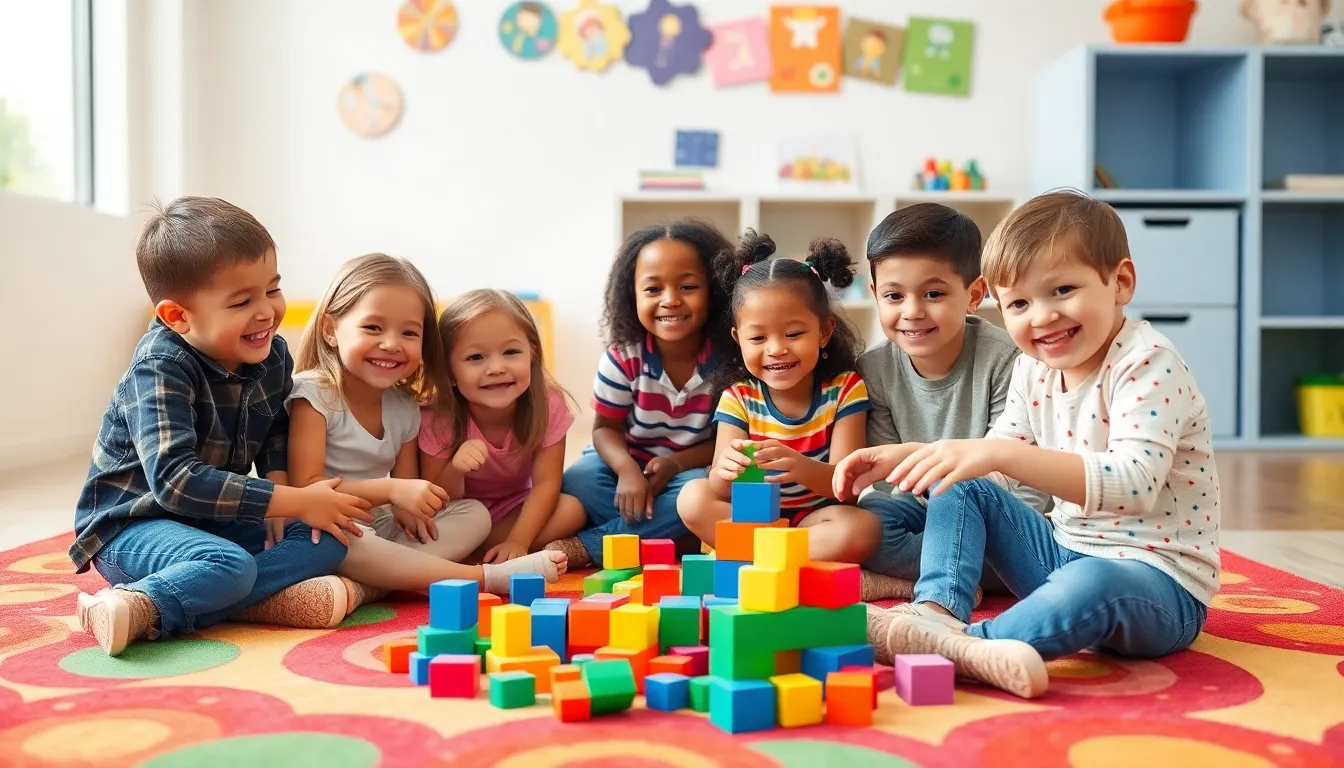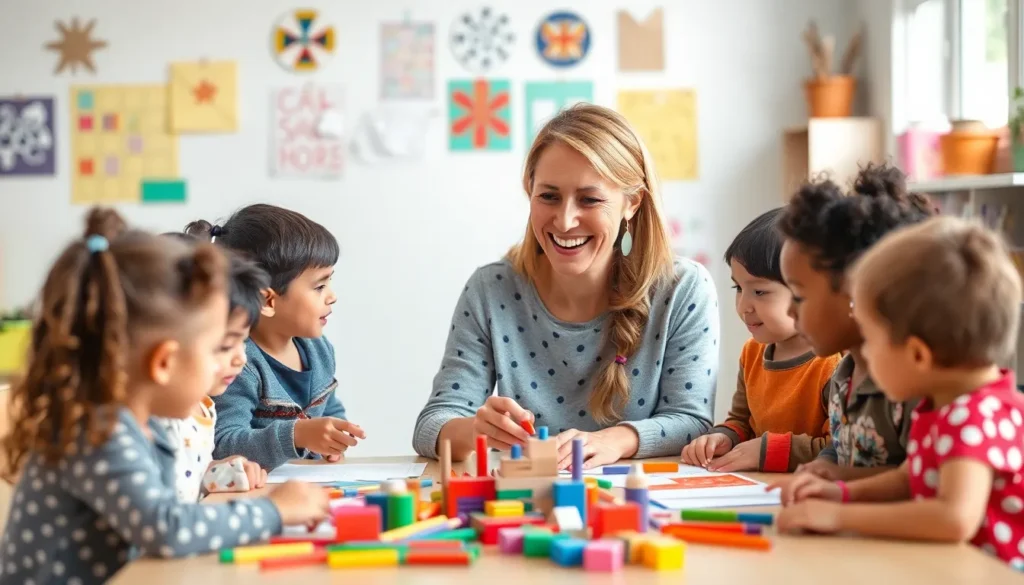Table of Contents
ToggleAs little ones embark on their educational journey, setting learning goals for preschool becomes crucial. Think of it as laying the foundation for a future skyscraper—without it, they might just end up building a sandcastle! Preschool isn’t just about finger painting and snack time; it’s a magical realm where curiosity blooms and creativity takes flight.
Understanding Learning Goals for Preschool
Educational objectives in preschool provide a roadmap for early childhood development. Growth occurs across several domains, including social-emotional, physical, cognitive, and language skills. Focusing on these areas helps guide educators in creating enriching environments.
Social-emotional goals encourage children to build relationships, express feelings, and develop empathy. Activities like cooperative play and sharing toys enhance these skills. Physical development goals involve improving fine and gross motor skills through activities such as climbing, jumping, and drawing.
Cognitive goals focus on fostering problem-solving abilities and critical thinking. Engaging children in puzzles, counting games, and exploring shapes achieves this aim. Language skills develop through reading, storytelling, and interactive conversations. Exposure to diverse vocabulary supports their ability to express ideas clearly.
Setting specific, measurable goals is essential for tracking progress. For instance, recognizing colors and shapes can serve as a benchmark in cognitive development. Identifying this growth allows educators to adapt teaching strategies based on individual needs and strengths.
Learning goals empower educators to create tailored curriculums. Each child’s unique interests and abilities shape the learning experience. Environments that prioritize curiosity and creativity lead to deeper learning and engagement. As preschoolers progress, these foundational skills prepare them for future academic challenges.
Importance of Learning Goals

Learning goals play a crucial role in preschool education, guiding children through essential developmental milestones. They help educators focus on specific areas, enhancing children’s overall growth.
Cognitive Development
Cognitive development focuses on enhancing mental skills. Problem-solving, critical thinking, and creativity are key components. Engaging activities like puzzles stimulate analytical thinking, while counting games strengthen numerical abilities. Children develop reasoning skills when they identify patterns or solve simple mathematical problems. These cognitive goals ensure that learning becomes an interactive experience, encouraging curiosity and exploration.
Social and Emotional Growth
Social and emotional growth is vital for preschoolers. Relationship-building occurs through cooperative play and group activities. Empathy develops as children learn to express feelings and understand others’ emotions. Setting goals in this area fosters communication skills, ensuring children can articulate their needs and feelings. Activities such as sharing, turn-taking, or role-playing nurture emotional intelligence. These skills prepare children for future interactions, laying the groundwork for positive relationships.
Key Learning Goals for Preschool
Setting clear learning goals ensures preschoolers develop vital skills necessary for their educational journeys. These goals provide a structured framework for holistic growth in various areas.
Language Skills
Language skills form a pivotal part of preschool learning. Vocabulary expansion occurs through storytelling, song, and interactive play. Listening skills improve during group discussions and shared reading experiences. Effective communication happens when children express their thoughts through conversation and simple writing tasks. These activities collectively enhance fluency, preparing children for future reading and writing demands.
Math and Numeracy
Math and numeracy skills are essential components of a preschool curriculum. Number recognition takes place through engaging games involving counting and sorting objects. Simple addition and subtraction become accessible through hands-on activities using toys or snacks. Patterns emerge as children explore colors and shapes, setting a foundation for more complex math concepts later. Engaging with math encourages problem-solving while building critical thinking abilities.
Physical Development
Physical development fosters motor skills and coordination in young children. Activities such as jumping, climbing, and running contribute to gross motor skills. Fine motor skills enhance through tasks like cutting, drawing, and manipulating small objects. Structured play supports balance and spatial awareness, allowing for safe exploration. Engaging in physical activities promotes overall health while developing self-confidence.
Creative Arts
Creative arts play a significant role in preschool education. Through activities like drawing, painting, and crafting, children express emotions and ideas. Music and movement enhance auditory and rhythm skills while fostering creativity. Engaging in drama activities improves confidence and communication. These artistic pursuits help develop critical thinking and problem-solving abilities as children learn to make choices and explore their creativity.
Strategies for Implementing Learning Goals
Implementing learning goals in preschool requires practical strategies. Educators focus on a blend of play-based learning and structured activities to foster development.
Play-Based Learning
Play-based learning serves as a critical method for achieving educational objectives. Children engage in imaginative play, which enhances language skills and cognitive growth. Activities like block building promote problem-solving and spatial awareness. Likewise, group play encourages social interactions, fostering empathy and communication. Observing children during play allows educators to identify individual strengths and interests. By aligning play experiences with learning goals, children explore concepts naturally and enthusiastically.
Structured Activities
Structured activities complement play by providing intentional learning experiences. Preschoolers benefit from routines like circle time and guided group activities. These settings promote listening, turn-taking, and participation, reinforcing social skills. Educators can incorporate targeted lessons that enhance specific areas such as literacy and math. For instance, story time cultivates vocabulary acquisition while counting games strengthen numerical understanding. Flexibility in these activities allows adjustments based on children’s responses and progress, ensuring meaningful engagement in learning goals.
Assessment of Learning Goals
Assessment of learning goals in preschool takes a multifaceted approach. Educators monitor children’s progress in various domains, including social-emotional, cognitive, physical, and language skills. They use observation as a primary tool, allowing them to gauge children’s engagement and response during activities.
Measurement of social-emotional growth occurs through tracking interactions during cooperative play. Group activities serve as a gauge for children’s ability to communicate and collaborate. Documentation of these interactions helps educators identify areas of strength and opportunities for improvement.
Cognitive skills assessment involves tools like puzzles and counting games. These activities reveal children’s problem-solving abilities and their understanding of numerical concepts. Regular evaluations help in adjusting teaching strategies to better suit individual needs.
Physical development assessments focus on motor skills through activities like climbing and drawing. Measuring progression in these areas gives insight into a child’s physical abilities and overall health.
Language skills assessment uses storytelling, songs, and interactive conversation. Observing children’s vocabulary and listening skills during these activities provides valuable data. Engaging children in dialogue reflects their understanding and use of language in various contexts.
Educators maintain records of each child’s progress toward these goals. Regularly reviewing this information fosters personalized learning plans tailored to each child’s growth trajectory. Feedback from parents and guardians also plays a role in shaping these assessments, ensuring a comprehensive view of each child’s development.
Utilizing various assessment methods leads to continuous improvement in teaching practices, promoting a supportive learning environment that enables preschoolers to thrive.
Conclusion
Setting learning goals for preschoolers is essential for nurturing their development across various domains. These goals provide a clear framework that guides educators in creating enriching experiences that foster curiosity and creativity. By focusing on social-emotional, cognitive, physical, and language skills, preschool environments become dynamic spaces where children thrive.
With effective strategies that blend play-based learning and structured activities, educators can support each child’s unique growth journey. Continuous assessment and observation ensure that learning remains personalized and responsive to individual needs. Ultimately, establishing learning goals lays a strong foundation for preschoolers, preparing them for future academic success and lifelong learning.







